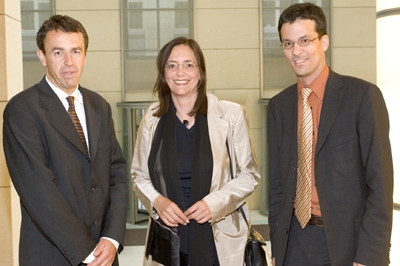
Deputy Foreign Minister and IJP Trustee Kerstin Mueller (center) and the winners of the 2004 Burns Award, Dr. Robin Mishra (right) and Dr. Mathias Rueb, winner of the German-American Commentary Award
Dr. Robin Mishra won the 2004 Arthur F. Burns Award for his diary of the 2004 U.S. presidential election campaign (“Mein Wahlkampf tagebuch”), which was published in almost 20 articles in the German weekly Rheinischer Merkur. Mishra supplemented his diary with editorials and portraits of presidential candidates George Bush and John Kerry for his German employer and his Burns host paper, the Chicago Tribune.
Mishra received the 1,000-Euro prize from Germany’s foreign minister at the annual Burns alumni dinner and lecture on June 3 in Berlin. The award usually goes to one American and one German alumnus for outstanding writing and reporting on the political, economic or cultural situation in each other’s country, or on the transatlantic relationship in general. While many good stories were received from U.S. Burns alumni, none stood out as worthy of a prize this year.
During Mishra’s three months in Washington, Chicago, New York and Florida, he painted a vivid picture of the U.S. national political landscape leading up to the November elections. His articles left readers well informed on the different campaign issues and also focused on the emotions and discrepancies of the campaign. Lennart Paul (2004) received an honorable mention for “Die Strassen von San Francisco (The Streets of San Francisco),” an eight-part personal account on topics ranging from the San Andreas fault line to Beatniks, and public safety hysteria to his own yearning for Berlin and its problems.
The 1,000-Euro German-American Commentary Award went to Matthias Rüb for “Kulturkampf in Amerika (Culture War in America),” published Nov. 4 in Frankfurter Allgemeinen Zeitung. As the paper’s Washington correspondent, Rüb pointed to the cultural divide across the American landscape as the main reason for President Bush’s reelection. Nils Minkmar received an honorable mention for his articles in the Frankfurter Allgemeinen Sonntagszeitung, in which he explained cultural conditions and their influence on political actions. Minkmar pointed out connections between popular culture and the building of a new “Left” in the United States. He also explained abstract concepts such as anti-Americanism.
Next year the German-American Commentary Award will be renamed in honor of former diplomat and author George F. Kennan. The jury for both awards was composed of journalists Sabine Christiansen (ARD), Dr. Christoph von Marschall (Tagesspiegel), Claus Strunz (Bild am Sonntag), Florian Illies (Monopol) and Dominik Wichmann (Süddeutsche Zeitung) as well as Dr. Frank-Dieter Freiling (ZDF) and Dr. Anna Prinz (Federal Foreign Office of Germany).
2006 Burns Award Winners
2005 Burns Award Winners
2003 Burns Award Winners
2002 Burns Award Winners